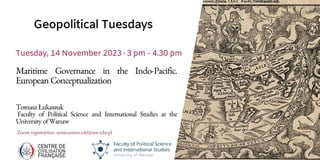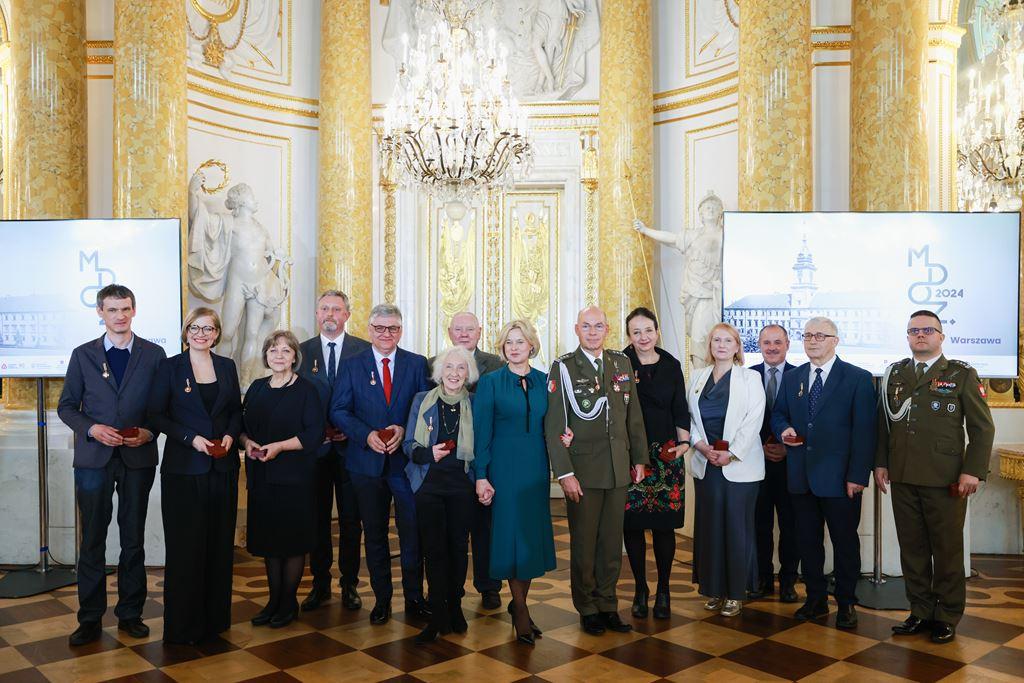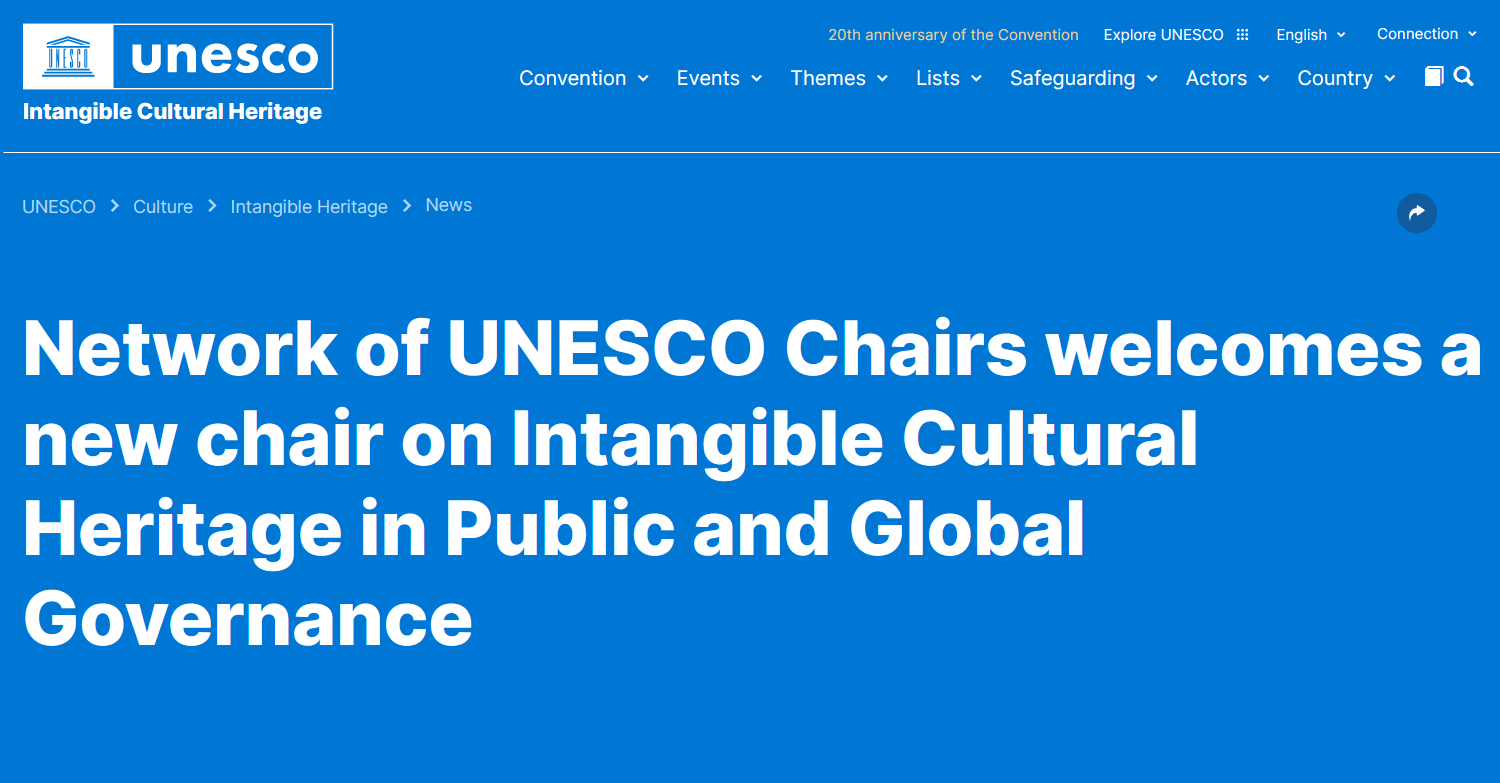Geopolitical Tuesday – Maritime Governance in the Indo-Pacific. European Conceptualization

Another edition of the musical Chopin Universe
October 27, 2023
Visitation of Dean and Professors from Kyungpook National University
November 15, 2023
Center for French Culture and Francophone Studies at the University of Warsaw, Faculty of Political Science and International Studies at the University of Warsaw invite you to the “Geopolitical Tuesday” seminar entitled:
Maritime Governance in the Indo-Pacific. European Conceptualization
which will be held on Tuesday 14th of November 2023 at 3 pm (CET)
with the participation of with the participation of Tomasz Łukaszuk
Faculty of Political Science and International Studies at the University of Warsaw
Zoom: https://uw-edu-pl.zoom.us/j/99464938741
The seminar will be held in English.
Abstract:
The 21st century brought the shift of global political and economic gravity towards the Indo-Pacific. The primary beneficiaries of the process of globalisation in the world economy became Indo-Pacific littorals. They transformed their economies, gaining significance on a global scale, aspiring to the role of regional or global powers. As a consequence of that process, the Indo-Pacific became the busiest and most significant communication corridor with the most extensive world container traffic and world petroleum transit, providing vital resources for all the region’s countries. Furthermore, the task of ensuring the security of Sea Lines of Communication (SLOCs) has been included in the maritime strategies of states, turning them from coastal to oceanic beyond their national jurisdiction. Growing asymmetric threats of piracy and terrorism, as well as the rise of China’s naval blue-water capabilities and its assertiveness in the South China Sea, elevated the importance of the Indo-Pacific as not only an area of significant international commercial transportation but also the area of the competition of the regional and extra-regional actors. The geopolitical significance of IOR is also marked by China’s quest to access the Indian Ocean and the Western Pacific as areas of fundamental strategic meaning through the SLOCs, and the theatre of maritime military operations. The ocean is increasingly subject to asymmetric threats. The diversified character of threats and complexity of the challenges influenced the maritime strategies of countries published at the beginning of the 21st century.
The maritime domain also became the most significant part of Indo-Pacific states sustainable development concepts. They developed their ways of economic exploitation of seas and oceans, turning them into blue economies. The related areas of maritime governance like protection of the marine environment and legal management also found their place in the Indo-Pacific littorals maritime strategies.
The main aim of the paper is to explain how the littorals of the Indo-Pacific Region apprehend maritime governance in the 21st century and how that apprehension influences their maritime policies. The Indo-Pacific Region is understood as the greater Indian Ocean, which links the Horn of Africa; past the Arabian Peninsula to the Indian subcontinent, past the Indonesian archipelago and beyond to the Pacific. Maritime governance implicates the cooperation of the states, which are interdependent. In contrast to the land surface, it is impossible to set physical borders on seas, to limit positive or negative phenomena in the environment (rise of sea level) or security (piracy and terrorism). Various activities focused on the use of living and non-living resources of oceans and seas, ways of securing their maritime transportation and protecting the marine environment from the adverse effects of these activities constitute the best example of the growing interlinkage among different activities at sea. Understanding the significance of those phenomena, the countries of Indo-Pacific created a network of organizations and multilateral agreements to tackle challenges in a holistic way. Some areas like military security have limited space for convergence of interests in the context of the rise of China and its strategy in the South China Sea. The paper also highlights the existing and potential cooperation mechanisms between regional and extra-regional partners, including the European Union members like France, Germany and the Netherlands, which also created their concepts apart from the European Union Indo-Pacific strategy.
Bio:
Tomasz Łukaszuk – Research Fellow at Department of Regional and Global Studies at the University of Warsaw. M.A. in international rstudies (1991). He worked in Polish foreign service for 25 years, serving in Norway, Indonesia, Singapore, East Timor, India, Afghanistan, Bangladesh, Bhutan, Sri Lanka, Nepal and Maldives. His field work experience in diplomacy includes also two years as a deputy director/joint secretary/director general and two years as a director/joint secretary/director general of Asia and the Pacific Department at Polish Ministry of Foreign Affairs. Being director/joint secretary he prepared the concept of Asia and the Pacific Forum aimed at deeper cooperation and coordination of most important scientific and research centers for Asian studies in Poland. He supported Polish universities and think tanks in developing their contacts and links with Asian partners in most important areas vital for the development of their cooperation. He represented Poland at various conferences on maritime issues, environment, Afghanistan, Afghanistan-Pakistan International Contact Group and ASEM preparing several papers and reports. His areas of expertise are integration processes in South and South-East Asia, Indonesian and Indian internal and foreign policy. At present his research interest are regionalism and interregional cooperation of Bay of Bengal countries as well as maritime strategies of biggest littoral countries of Indian Ocean. Member of the International Studies Association and fellow at Global India program of the European Union.
Recent publications:
- Łukaszuk, Stosunki Polski z krajami Azji i Pacyfiku w 2002 roku, 2003.
- Łukaszuk, Stosunki Polski z krajami Azji i Pacyfiku-1989-2003, [w:] Azja Wschodnia na przełomie XX i XXI wieku. Stosunki międzynarodowe i gospodarcze, (red.) K. Gawlikowski, M. Ławacz, Warszawa, 2004, s. 243-273.
- Łukaszuk, The Concept of Maritime Governance in International Relations, “Stosunki Międzynarodowe – International Relations”, 2018 nr 4, s. 123-144.





